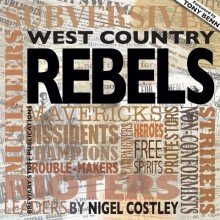Dorset’s secret rebel past comes to life in a new book charting howturbulent events through history shaped the county’s communities.
West Country Rebels, a digest of the people who have challenged authority or taken a radical stance towards society,has been compiled by Nigel Costley, the regional secretary of the South West TUC.
He explains how Dorset, now seen as a tranquil corner of Britain, was once a hotbed of struggle, riots, rebellion and strikes.
Nigel Costley said: “As the Olympics opening ceremony showed, history isn’t all about kings and queens. I wanted to tell the tales of the men and women across the West Country who inspired change by their courageous actions.”
Fittingly, the book has a foreword by Tony Benn, one of the region’s longest serving MPs and a champion for social history and radical politics, who wrote: “For West Country people it will relate to their own experience. It establishes a link between them and earlier generations and encourages the inheritance we get for future struggles.
“Every generation has the same battles again and again, no issue is finally won and no issue is finally lost. Giving people hope is the most important thing and that’s what this book does. It is a very remarkable book.”
West Country Rebels is available now at https://www.breviarystuff.org.uk/nigel-costley-west-country-rebels/
West Country Rebels covers a lot of ground and its broad sweep starts with the resistance to Viking occupation in the 800s. The region was the front-line in the conflict that eventually saw Alfred on the throne.
Opposition to unfair taxes, tolls and the imposition of religious rites caused a number of uprisings born in the region.
The Western Rising fought the enclosure and seizure of common lands. Parts of Dorset were at one time covered in woodlands and in the seventeenth century there were many battles over attempts to enclose the forests. The towns of Mere and Gillingham were at the centre of a long-running fight to retain the right to collect wood and fences were often smashed.
West Country Rebels features the twists and turns of the Civil War and highlights less well-known episodes such as the women who defended Lyme Regis and the Clubmen who resisted both side of the conflict. Hambeldon Hill near Blandford saw the Clubmen beaten by the superior force of Cromwell’s troops.
Former generations lived on their wits and survival often meant breaking the law. Smuggling was a part of everyday life for many coastal communities. Key figures like Isaac Gulliver are brought to life in the book. He made a fortune from the illicit trade and used places like Kinson Church to hide contraband and Eggerdon Hill as a beacon.
Ordinary people had no vote and little say in the way society was run and when prices rose, pay fell or taxes imposed they fought back through refusals to pay or riot and wrecking. The book demonstrates just how common such insurrection was and many such episodes were not just outbursts of anger but well organised and co-ordinated rebellions.
The Tolpuddle Martyrs, Dorset’s best know rebels, have their story told along with other early battles to support farm workers.
The book covers the Chartist cause and the local women who joined the suffragettes to demand the vote. It features individuals from the area who took a radical stance and led progressive campaigns.
The Webbs who set up the left-wing Fabians and their connections with Bournemouth, the lesbian Dorset poets, Sylvia Townsend Warner and Valentine Ackland are amongst many others who helped shift public opinion.
Strikes amongst Bridport ropemakers and the sacrifice of the Tyneham residents are included.
The fight for equalities, decent housing and the NHS have a West Country story contained in the book.
It is a colourful race through the West Country’s more turbulent history.
West Country Rebels is available now at www.breviarystuff.org.uk/







